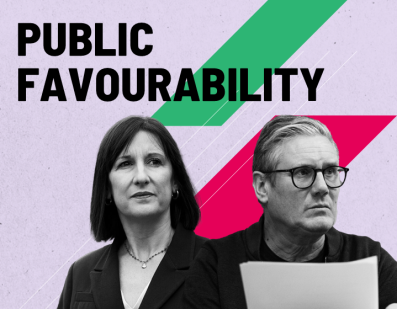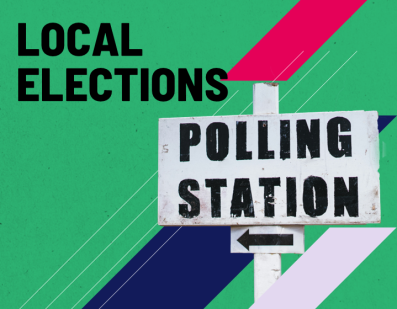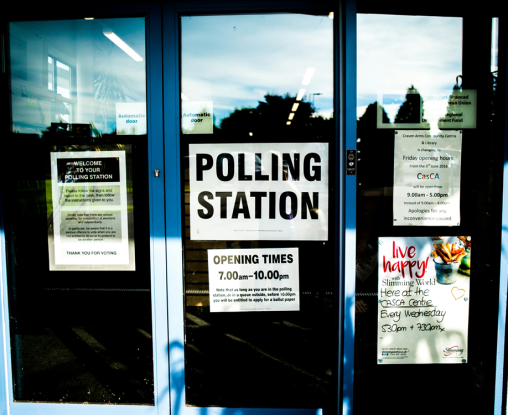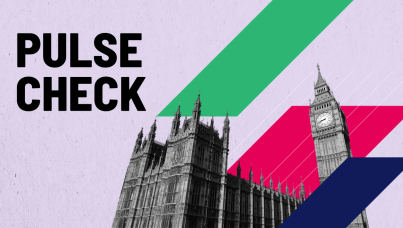Pulse Check - April 2025
Checking the pulse of the nation
-

Economic Optimism at its lowest rate ever recorded
In April 2025, 75% of the public thought the economy would get worse, 13% said stay the same, and 7% said it would improve, resulting in a net optimism index rating of -68. This is the lowest EOI rating in Ipsos’ records going back to 1978, beating the previous lowest rating of -64 seen in January 1980, July 2008 and June 2022.
Click here -

Public favourability ratings dip
Public favourability ratings for Keir Starmer, Rachel Reeves and Labour all dip this month, cancelling out much of last month’s improvement. 23% of Britons have a favourable view of Prime Minister Keir Starmer, down from 29% last month. Just 15% of Britons hold a favourable view of Chancellor Rachel Reeves. 55% are unfavourable, giving her a net favourability rating of -40, down from -33 last month.
Click here -

Local Elections
Over half of Britons express a lack of confidence in any of the main political parties' ability to run either the country or their local council effectively. However, Reform UK and Labour are neck and neck when it comes to the percentage who are confident in their ability to run the country (35% and 33% respectively), while Reform UK, Labour, and the Liberal Democrats are tied when it comes to local councils (all 34%).
Click here

Local Elections 2025: why they matter - and why Reform UK is watching closely
When, where, and why should you care?
On Thursday 1 May, voters across some parts of England will head to the polls for local elections covering 23 councils and 6 mayoral posts (plus a byelection in Runcorn & Helsby). But if that’s news to you, you’re not alone.
Our polling with the Local Government Information Unit found 64% of the public admit they know little or nothing about what local councillors actually do, and 63% aren’t following plans to devolve more power to local government.
However, the importance of local councils isn't lost on Britons, and most people do value local input. While many don’t know the ins and outs of local government, they still know it matters. And come 1 May, that’s likely to be front of mind when voters cast their ballots.
What's influencing the vote?
The top two factors that would drive vote choice in the local elections are a mix of local and national:
- How their local council has run things over the past few years (38%).
- How the UK Government has run the country since the election in July 2024 (38%).
The issues that really move the dial are also a mix of national and local concerns:
- The cost of living (50%)
- The NHS (45%)
- The economy (40%)
- Crime (34%)
- Immigration (33%, but rising to 56% for Reform UK voters)
- The state of local roads and pavements (32%).
Views on local services are mixed. 48% say they’re in good shape, 45% say the opposite. Whether it’s praise or blame, people tend to point the finger at their local council, but the current and previous national governments also get their share of criticism.
Reform UK: local elections, big test
We can't talk about local elections without mentioning Reform UK. Given they will be standing many new candidates in wards they haven’t contested before their exact performance is difficult to predict, but the public mood gives us plenty to work with.
Just look at the national picture:
- 59% think the UK is heading in the wrong direction.
- 45% think Labour is doing a bad job running the country.
Enter Nigel Farage - a divisive figure, but seen by many as a straight talker who understands the country’s problems, particularly around immigration. Reform UK can tap into that dissatisfaction, especially in the “service, manufacturing and mining legacy” areas across north England and south Weales where voters feel most left behind.
According to our Understanding Society, in these communities, 60% believe Westminster spends less on their area than others. There is also lower satisfaction with community cohesion, quality of life, jobs and crime compared to the UK averages.
Reform have a real opportunity to appeal to people's desire for change. But voters still have doubts. Many think Farage is too divisive, too close to Trump and there are real questions about whether Reform has the talent to govern. Plus, Keir Starmer still leads Farage on the "best Prime Minister" question.
Reform UK are standing more candidates than before, with Farage talking about “parking tanks on Labour’s red wall lawns.” These elections pose an important test for the party, but nationally Reform still have further to go to demonstrate their credibility beyond key issues such as immigration.
The bottom line
Local elections might not dominate headlines, and low turnout and local factors means we have to be careful drawing national lessons, but they could reveal just how far the appetite for change really goes. In particular, attention will be on Reform UK and how they can capitalise on discontent with the two main traditional parties to show they are ready to play for a bigger role in Britain’s political future.







